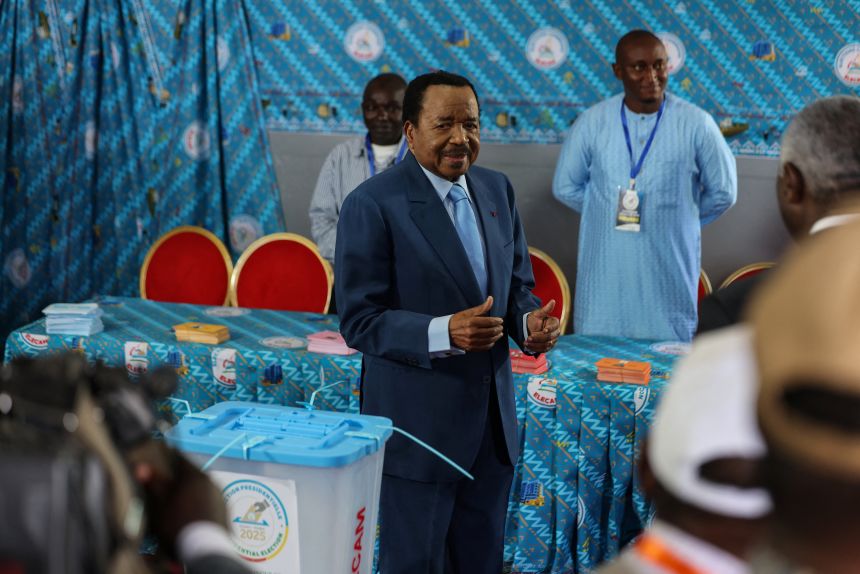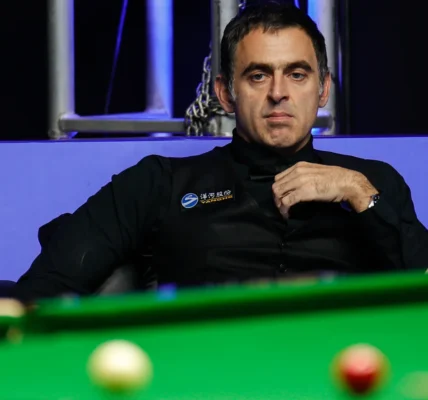Skip to content
Paul Biya



At the age of 92, Paul Biya has been declared the winner of the presidential election in Cameroon, securing an eighth term in office.
Though he has held power since 1982, the latest victory has elicited fresh controversy, growing public frustration and heightened political risk for the Central African country.
The basics of the result
-
The election was held on 12 October 2025, and results were officially announced on 27 October by the country’s Constitutional Council. (AP News)
-
Biya was reported to have won 53.66 % of the vote. (AP News)
-
His main challenger, Issa Tchiroma Bakary, a former minister, came second with roughly 35.19 % of the vote (according to the official tally). (AP News)
-
Tchiroma rejects the official result, claiming he actually won and accusing the system of manipulation. (The Guardian)
-
With this victory, Biya is set to remain in office for a new seven-year term, meaning his rule would continue until he approaches 100 years old. (Nairametrics)
Why the election is controversial
-
Longevity and age: Biya first took office in 1982 and is now the world’s oldest serving head of state. (AP News)
-
Term-limits removed: Term limits were abolished in 2008, enabling indefinite rule and clearing the pathway for Biya’s long tenure. (Reuters)
-
Allegations of irregularities:
-
Opposition supporters claim there were dead voters on registers, ballot box tampering and vote counting issues. (AP News)
-
Four people were reported killed during protests in the economic capital Douala following the election result. (The Star)
-
Prior to the result, Tchiroma claimed gunfire targeted civilians near his home in Garoua. (Reuters)
-
Youth and generational divide: Over 70 % of Cameroon’s population is under 35.
-
Many young people view the system as stalled and dominated by an aging leadership. (AP News)
-
Political and security background: The country continues to face serious challenges — a long-running Anglophone separatist insurgency in the west, attacks by Boko Haram in the north, economic frustration and inequality.
-
The election took place against this backdrop of instability and demand for change. (AP News)
What it means going forward
-
Political stability risk: The rejection of the results by a significant portion of the opposition and the violent clashes — including the deaths of protesters — raise the risk of further unrest.
-
Analysts warn of a possible escalation if large sections of the populace feel unheard. (The Star)
-
Continuity of policy and leadership style: With Biya secured, the ruling party Cameroon People’s Democratic Movement (CPDM) will likely continue its strategy of centralised control and incremental reform rather than wholesale transformation. That may disappoint voters seeking rapid change.
-
Questions of succession and governance: At 92, questions about Biya’s health, succession plan and the durability of his grip on power loom large.
-
Critics argue the lack of a clear transition pathway creates uncertainty for Cameroon’s future.
-
International and regional implications: Cameroon is a key player in regional security in Central Africa, especially given its border with Nigeria and its role in counter-terrorism.
-
A crisis of legitimacy at home could reverberate regionally.
-
Youth engagement challenge: The youth bulge presents both an opportunity and a risk: if younger voters remain disengaged or feel disenfranchised, it could undermine the legitimacy of future elections.
-
Some already say they will not participate due to lack of faith in the system. (AP News)
In context
-
Biya is only the second head of state to lead Cameroon since it gained independence from France in 1960. (The Citizen)
-
His re-election continues a pattern where incumbents in several African countries have used constitutional, electoral and institutional tools to extend their rule.
-
The major opposition challenge came from someone who once was an insider (Tchiroma) — illustrating the weakness and fragmentation of the opposition in providing a credible alternative.
Key take-aways
-
Biya’s declared win is officially valid, but widely questioned in terms of fairness and legitimacy.
-
The continuity of his power raises questions for young Cameroonians and reform-minded citizens seeking change.
-
The peace and stability of Cameroon, already under pressure from multiple security and economic fronts, may now face a new test in terms of social cohesion and governance credibility.
-
The world will watch to see whether the opposition remains peaceful, whether any reforms are launched to improve electoral integrity, and how Biya’s government tackles the big-ticket issues like youth unemployment, separatism and governance.






